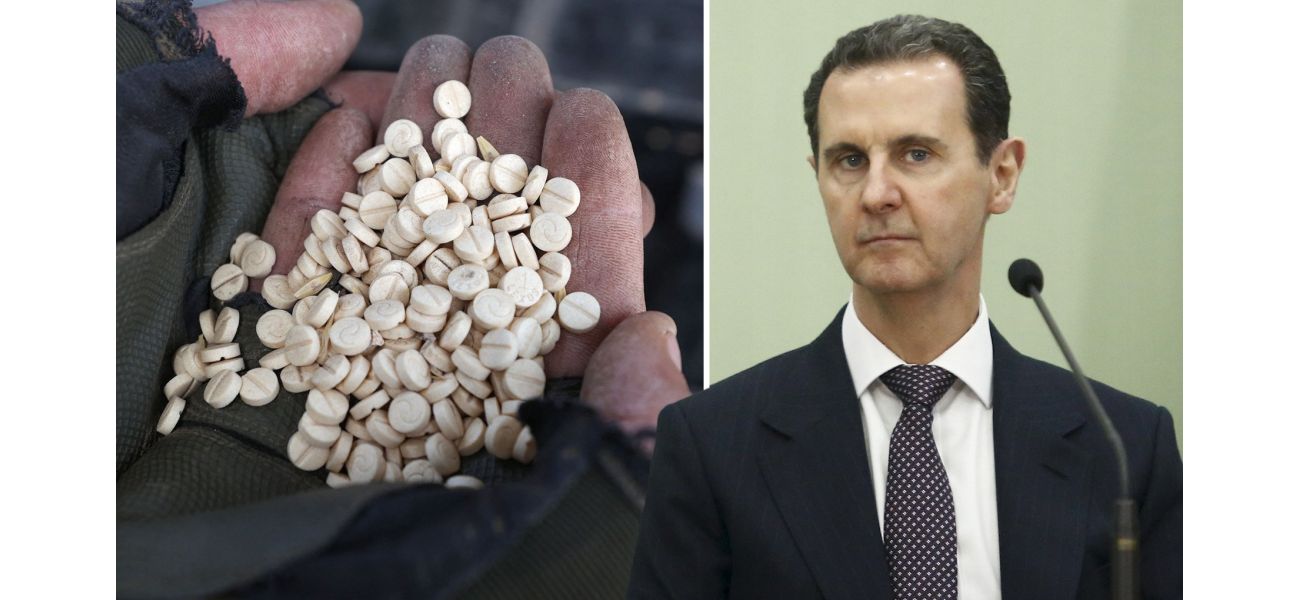The drug trade helped finance Bashar al-Assad's $5 billion Syrian empire.
The cost of making it is low, but it can be sold for a high price, resulting in significant profit for Assad.
December 11th 2024.

In a shocking turn of events, Syrian rebels successfully seized control of the capital city of Damascus in an unexpected offensive, toppling the infamous "tyrant" President Bashar al-Assad from his iron-fisted rule. The world rejoiced at the news, but many wondered how Assad managed to cling onto power for so long.
As it turns out, Assad's secret weapon was a highly addictive drug called Captagon, also known as the "poor man's cocaine". This drug, which costs less than a pound to produce, raked in over £5 billion in just one year for the Assad regime, funding their campaign of terror. It was even the drug of choice for ISIS fighters.
Experts believe that after the economic crisis caused by the Syrian civil war in 2011, the Assad regime turned to producing Captagon to generate new sources of income. Despite their denials, it has been found that over 80% of Captagon production worldwide happens in Syria.
This drug trade proved to be incredibly lucrative for the Assad regime, bringing in a staggering £5 trillion in 2021 alone. However, with Assad's fall from power, the flow of Captagon has come to a near halt. Smuggling operations have decreased by 90% in just the past week, with only small workshops and players remaining on the borders.
But this sudden decrease in Captagon production has left a void that could potentially be filled by Iran, according to Middle East security analyst Nicholas Krohley. And while the collapse of the drug trade may be seen as a positive outcome, it is not the only aspect of Assad's regime that is crumbling.
The prison system in Syria is undergoing a complete overhaul, with all prisoners being released. This is in response to the horrific conditions and human rights violations that have been uncovered, including torture and lack of fair trials. Over 100,000 people have died or been executed in Syrian prisons since the civil war began, with a third of those deaths occurring in Sednaya prison.
This infamous prison, known for its brutal treatment of women, children, and peaceful activists, has become a symbol of Assad's tyrannical rule. Out of the thousands who have been sent there, only a small fraction have ever been released, and families have been left in the dark about the fate of their loved ones.
As the Syrian people continue to rebuild their country in the aftermath of Assad's regime, the drug trade and prison system are just two of the many issues that they must address. But with the fall of Assad, there is hope for a better future and a chance for justice to be served for those who have suffered under his rule.
As it turns out, Assad's secret weapon was a highly addictive drug called Captagon, also known as the "poor man's cocaine". This drug, which costs less than a pound to produce, raked in over £5 billion in just one year for the Assad regime, funding their campaign of terror. It was even the drug of choice for ISIS fighters.
Experts believe that after the economic crisis caused by the Syrian civil war in 2011, the Assad regime turned to producing Captagon to generate new sources of income. Despite their denials, it has been found that over 80% of Captagon production worldwide happens in Syria.
This drug trade proved to be incredibly lucrative for the Assad regime, bringing in a staggering £5 trillion in 2021 alone. However, with Assad's fall from power, the flow of Captagon has come to a near halt. Smuggling operations have decreased by 90% in just the past week, with only small workshops and players remaining on the borders.
But this sudden decrease in Captagon production has left a void that could potentially be filled by Iran, according to Middle East security analyst Nicholas Krohley. And while the collapse of the drug trade may be seen as a positive outcome, it is not the only aspect of Assad's regime that is crumbling.
The prison system in Syria is undergoing a complete overhaul, with all prisoners being released. This is in response to the horrific conditions and human rights violations that have been uncovered, including torture and lack of fair trials. Over 100,000 people have died or been executed in Syrian prisons since the civil war began, with a third of those deaths occurring in Sednaya prison.
This infamous prison, known for its brutal treatment of women, children, and peaceful activists, has become a symbol of Assad's tyrannical rule. Out of the thousands who have been sent there, only a small fraction have ever been released, and families have been left in the dark about the fate of their loved ones.
As the Syrian people continue to rebuild their country in the aftermath of Assad's regime, the drug trade and prison system are just two of the many issues that they must address. But with the fall of Assad, there is hope for a better future and a chance for justice to be served for those who have suffered under his rule.
[This article has been trending online recently and has been generated with AI. Your feed is customized.]
[Generative AI is experimental.]
0
0
Submit Comment





